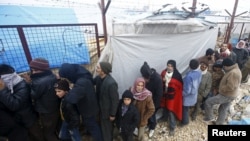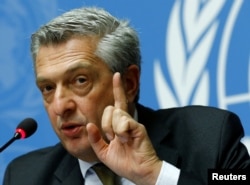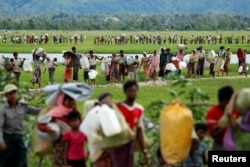The United Nations refugee chief says the growing crisis of global displacement is the result of weak international cooperation and the inability to prevent, contain and resolve conflicts.
"Have we become unable to broker peace?" U.N. High Commissioner for Refugees Filippo Grandi asked the U.N. Security Council, which is charged with maintaining international peace and security.
He noted that a series of new crises has caused massive displacement across virtually every region of the world.
"The number of people forcibly displaced worldwide is now approaching 66 million," Grandi said Thursday, adding that the wars in Syria and Iraq are responsible for a quarter of all persons forcibly displaced.
And while those conflicts grind on, new ones have developed and old ones have reignited, all causing untold suffering. Last year, only a half-million refugees worldwide returned home.
"When I meet refugees, their first question is not about food or shelter, but about peace and security — because it is security, and peace, that will convince them to return home," Grandi said.
"But giving hope to millions of uprooted people, and avoiding a repeat of recent, massive outflows, ultimately rests on political solutions," he told the council.
Rohingya crisis
Since August 25, more than 600,000 mostly minority Rohingya Muslims have fled from Myanmar's northern Rakhine state to neighboring Bangladesh, in the wake of a military operation against Rohingya militants.
The crisis has spiraled into the world's fastest-growing refugee emergency.
"People continue to come, so they don't feel safe there," Grandi said of the exodus, noting the Rohingya were unlikely to return home until violence stops and people feel they can return in safety.
He also urged the government to implement the recommendations in the Advisory Commission report led by former U.N. chief Kofi Annan, which include carrying out inclusive development in Rakhine, more access for humanitarian workers, and progress on the citizenship issue for the stateless Rohingya.






